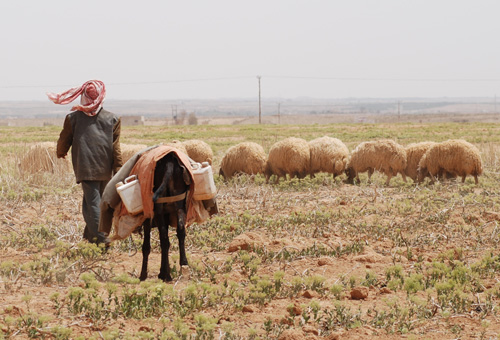 A monitoring system devised by Guelph geographers will help preserve arable land and feed a growing population in “the Switzerland of the Middle East.” So says U of G professor emeritus Bill Nickling, who along with Prof. Ze’ev Gedalof has spent four years working on a sustainability project in Jordan.
A monitoring system devised by Guelph geographers will help preserve arable land and feed a growing population in “the Switzerland of the Middle East.” So says U of G professor emeritus Bill Nickling, who along with Prof. Ze’ev Gedalof has spent four years working on a sustainability project in Jordan.
The country is threatened by land degradation and desert spread. Only about seven per cent of its land mass is arable, and farmers rely largely on dwindling groundwater resources.
That resource pressure is increasing as Jordan struggles to accommodate population growth fed by refugees fleeing strife in neighbouring countries, including Syria and Iraq.
The Guelph professors helped develop a monitoring system, including technology to gauge changes in soil moisture, vegetation and erosion. They hope their system will help the Jordanian government and university partners there to assess land resource changes and, ultimately, stem further desertification.
The researchers had received a $458,000 grant for the project under the Science for Peace and Security program of the North Atlantic Treaty Organization (NATO).
Unlike many destitute refugees fleeing conflict and natural disasters in other parts of the world, many people arrive in Jordan with enough money to buy tracts of farmland for housing. Referring to the country as the Switzerland of the Middle East, Nickling says, “It’s a safe haven.”
Those new arrivals place further strains on water resources. “Jordan is the breadbasket of the Middle East. People taking agricultural land out of production is a real problem.”
Gedalof says the research team has seen conditions deteriorate in northern Jordan during the past four years. “The potential for degradation and desertification is incredibly high.”
A desert geomorphologist, Nickling led the project with a counterpart at the University of Jordan. He belongs to a NATO body on desertification, which threatens many Mediterranean countries.
Referring to the researchers’ model, Gedalof says, “This technology could be adapted for any desert in the world. The model would need to be fine-tuned to account for differences in soil properties, weather and agricultural practices.”
Both U of G researchers visited Jordan during the project and also hosted Jordanian representatives and students for training here. This past fall, they led a workshop to share their monitoring system with scientists, government and industry.
[slideshow gallery_id=”7″]